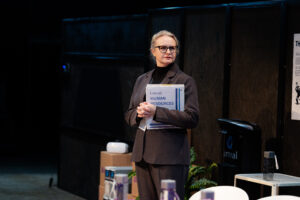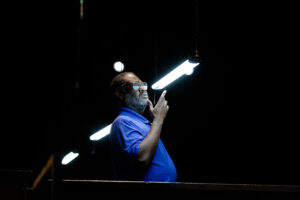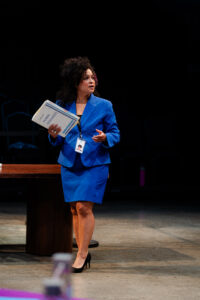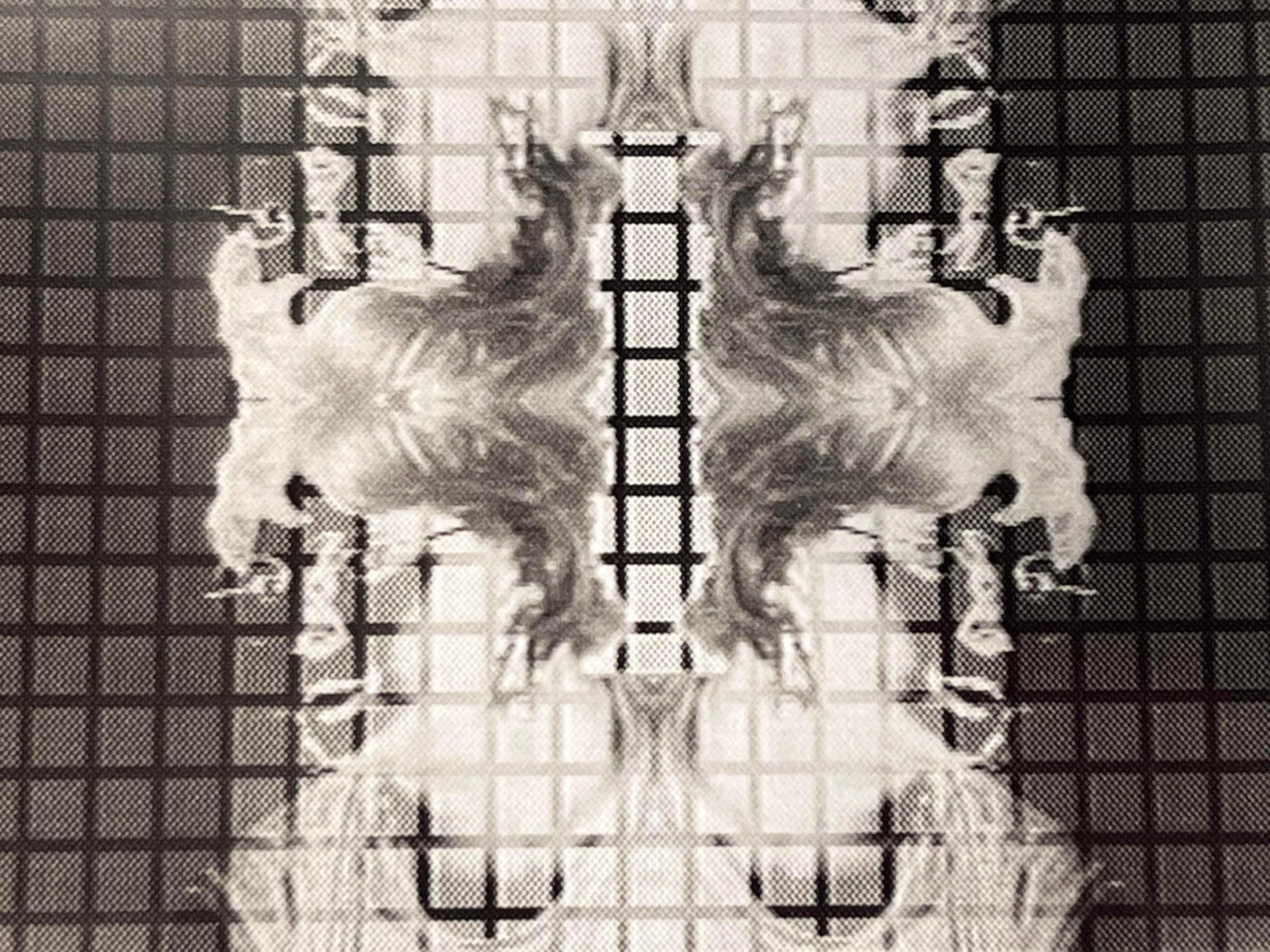A Review of ‘Human Resources’ presented by Nashville Story Garden and OZ Arts Nashville
As a trailblazer that continues its commitment in supporting the out-of-the-box local and international theatrical expression, OZ Arts Nashville doesn’t seem to shy away from transforming itself to accommodate the needs of the artists it hosts.
For Human Resources, written by Nate Eppler (award winning playwright and director of Playground writing incubator), directed by Lauren Shouse (award winning director, currently Assistant Professor of Theatre Directing at Middle Tennessee State University) and devised and developed by Nashville Story Garden, the stage is turned into an arena, one of the more common formats of contemporary experimental theater. Following Geoff Sobelle’s Food, this is the second time I experienced a performance at OZ Arts Nashville in this format. It is very fitting for a performance that aims to expose an exaggerated portrait of corporal dynamics, its hierarchies, and the meaning(lessness) of the concept of work and work-life in today’s success-driven positivist warp.

Human Resources is a purposefully fractured theatrical experience, delving into the idle work lives of the manufacturers of a pharmaceutical corporation whose external image is an inverted facade of the values it promotes. The staging has an immersive nature, and it invites the audience to a thoroughly curated encounter. A somewhat participatory experience with orchestrated transitions in perspective that may pose a challenge for those with mobility issues, which is why the promotion of the performance should have advised this feature. The performance handout states the nature of audience participation; however, the handouts are only given out once someone is entering the stage and has already committed to experiencing this show.
The tone is set at the foyer or behind the limits of what has been taken in as a stage: filing cabinets, folded computer parts, screens where Dr. Goodapple (Geoff Davin), the representative of Liminal, promotes the ten tenets of Liminal Corporation, under impersonal jazz tunes. A commercial promoting Zealiva, a drug that improves productivity at work and helps workers fulfill Liminal’s tenets, occasionally takes over the screens, reminding us of the unconsented commercials to products we are exposed to in our everyday lives. There’s a witty wordplay happening right there: ‘liminal’, or in between, which gets further opened during the performance and ‘zealiva’, a drug that activates zeal and pushes workers to feel alive, when they are actually feeling demotivated because they hate their jobs!
In the waiting room, the audience is also offered signature “9 to 5 Collins drinks”, promoted as fully utilizing citrus fruits. Unmistakably, a reference to the feminist comedy Nine to Five directed by Colin Higgins, starring Jane Fonda, Lily Tomlin, Dolly Parton, Dabney Coleman, Elizabeth Wilson, and Sterling Hayden.
The Liminal staff, apropos, the actors of the play are promoted on a company poster, and at another corner, a tribute is paid to the deceased worker Judy, whose values have been calculated in percentiles within the scale of the company, while later, the reaction to her death on her work desk during her weekend overtime has been memorized by the workers and is robotically replayed with a mimicked gesture and the wording: “So sad, so sad!”.
The set design (Diana DeGarmo), props design (Madeleine Hicks) and lighting design (Phillip Franck) turn the OZ Arts Nashville stage arena into a floor of the Liminal Pharmaceuticals’ headquarters. The branding of the office materials including the Liminal logo (designed by Chris Ammons) looks so genuine, it pushes one to question whether we should believe in the legitimacy of anything that has a brand design. Boxes of Zealiva are spread all over and we can see the staff arriving and saluting the logo of the company with militaristic gestures (Is this what one could call Corporate Patriotism?), before they disappear into their cubicles, performing motorized and repetitive movements. A worker’s chair has its nylon wrapper still on, a signifier of the sterility, discomfort, and the detachment of the workers from their working space.

Every few minutes, a Squid Gameish sound (sound design by Tasha AF Lemley) announces ideological breaks to remind the workers of the tenets of the corporation. This is pleasingly choreographed and is a testament to Nashville Story Garden’s dedication to extensive teamwork in devising their works and their emphasis on incorporating physicality to storytelling on stage.
The fourth wall in this performance is broken when the audience members are addressed as “external stakeholders” alias consumers. This also alludes to the awareness that the actors are being watched, another reference to George Orwell’s 1984, although they don’t hesitate to go through their full arch which is ardent and rocky.
The simulation of utilitarianism is broken when Harper (Lauren Berst, also co-director of Nashville Story Garden) comes in to address an HR issue: an anonymous complaint of a worker from this particular floor. While the complaint boxes are available, based on how the rest of the storyline develops, complaints not only seem to not lead to the improvement of the work environment, to the contrary, they may cause even more harm and might backfire. Harper’s language and behavior are an exact portrayal of an HR representative, and this produces a lot of humor when heard on stage and accompanied by exaggerated grotesque acting. The play is filled with sparkling farcical punchlines such as “empty seats disrupt focus”, “check the pulse”, or “Jargon will not save you!” (- Andie, played by Meggan Utech) that are familiar to the audience and burst them into laughter, same as when Dr.Goodapple wears a VR set, to enter the “profit envisioning center”.

As we rotate our seats, we get to experience the work life of those in the cubicles. Other critical commentaries on corporate work life such as workers not fully knowing their jobs because of their partial training, as in the case of Beenz (Tamara Todres, also co-director of Nashville Story Garden) or Blake (Joe Mobley), the only one who knows how to do a certain job of handling cables, speak to the absurdity of bureaucracy that recalls Franz Kafka’s remarks on the establishment. While we can partially hear the drama on the other side of the cubicles, we can’t see it nor are able to fully focus on what’s happening in front of us, so we’re curious, distracted, disturbed and anxious because we are missing out! This fragmented perception intends to pose the crucial question that the production team of this performance wants the audience to ask themselves: How can we relate to anything if we’re constantly being fed with fractured experiences?
A significant breaking point occurs with the empowerment of the janitor Loggs (Bakari King) when he breaks his observational silence and expands his role to what others at this office envy: that his life extends beyond the walls of Liminal. Thus, the play also becomes a reflection on loneliness and the meaninglessness of the life-work split which undoubtedly made many audience members whisper the name of the TV series Severance.
The performance ends in a rather depressing point. Andie’s declaration: “There’s always one more step that keeps them where they are and us where we are” is backed up by the immediate replacement of the holder of the leather chair, while the lower ranked workers will go back to their everyday routine.
Human Resources, is undoubtedly one of the most experimental and poignant theater pieces developed and staged in Nashville in the past few years. The impressive focus on details and the hard work of the performance team was clearly visible. The mobility issue was skillfully managed by the OZ Arts staff, but a mobility warning would have been needed for this performance.




Such a wonderful piece, performance and production! I’d seen Wesley Paine, Bakari King, and Candace-Omnira in the Rep’s ‘Our Town’ just last year. It is a testament to their talent that they can slip between these markedly different characters so fluently! Ayla Williams was hilarious with her birthday card and red nails! I loved Tasha Lemley’s use of Pink Floyd’s classic “Several Species of Small Animals Gathered Together and Grooving with a Pict” just when everything got dangerously tribal. One last thing; the seating! As they shifted the audience from section to section, with a different number of chairs in each row and section it felt like we, like those characters onstage, were needlessly jockeying within the randomly constructed corporate hierarchy of the Liminal. Great Performance (and review!)
Thanks for writing this thoughtful review, Fjolla! We are overwhelmed by the positive audience response for this hilarious and thought-provoking new work. I’m so proud of all the hard work the artists put into make this original performance a success.
I hope everyone will come join us for a 2nd and final weekend of performances, April 2-6. A quick note on accessibility: after seeing the audience movements during the transitions of the first performance, we modified the seating so there is a row of chairs on the floor on all sides. We had audience members attend over the weekend who used a range of canes, walkers, or wheelchairs to move about the space and all went smoothly. I encourage everyone to attend who is interested!